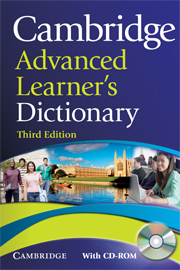

The Cambridge Advanced Learner's Dictionary (abbreviated CALD), commonly referred to as the Cambridge Dictionary, is a British dictionary of the English language. It was first published in 1995 under the title Cambridge International Dictionary of English by the Cambridge University Press. The latest version of the dictionary is Cambridge Advanced Learner's Dictionary 4th Edition which was informed by the Cambridge International Corpus [1] . The dictionary has over 140,000 words, phrases, and meanings including words from the areas of technology, media, language, society and lifestyle [2] [3] . With 32-page Focus on Writing section, it is suitable for learners at CEF levels B2–C2 [1] .
Contents
There is an online version of Cambridge Advanced Learner's Dictionary & Thesaurus with different translation dictionaries [4] .